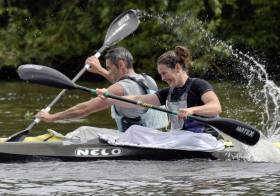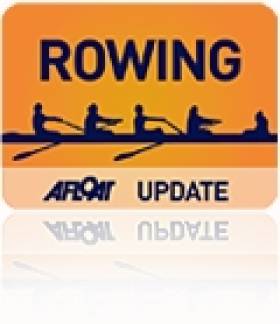Displaying items by tag: Foley
Jenny Egan and Peter Egan in Same Boat for Liffey Descent
#Canoeing: An international contingent will take on the Liffey Descent this Saturday, September 23rd. A Spanish crew who are determined to beat all comers in the canoe race will contend with a world champion from South Africa in a field of over 500 competitors. The Irish resistance will include a first time pairing in the race of world championship medallist Jenny Egan with her brother Peter – a winner last year.
Top competitors will be fitted with GPS trackers so the public can follow their progress down the course.
The race from Straffan in Kildare to Islandbridge in Dublin is one of the most spectacular events of the Irish sporting calendar. Kayaks and canoes will hurtle down the 30-kilometre stretch. They will find their way over 10 weirs, and paddlers must scramble out and carry their boat down the bank at Leixlip. Spectators can view the speed and the spills from the bridges and the banks. The start is at 12 o’clock.
The line-up for the K2, the racing kayak which is set to be the fastest boat of the day, should make for an exciting race.
Ireland international Barry Watkins teams up with Jon Simmons, who has been coaching developing paddlers in Ireland system. They take on the accomplished Spanish pairing of Luis Amado and Miguel Llorens, who took fourth in the World Marathon Championships in South Africa earlier this month. From South Africa comes Sean Rice, a world champion in surfski racing, who teams up with Briton Tom Sharpe.
Last year Peter Egan was in the front of the K2 which won – this time the paddler behind him will be his sister, Jenny, in a mixed K2. “We’ve always wanted to do it, but the circumstances were never right before,” Jenny said.
The Egans come directly from the World Championships, where Jenny took a bronze medal. But they will be tested on Saturday. From Germany comes Andreas Heilinger and Inez Bauerle; from the Netherlands, Pascal Lucker and Eef Haaze.
Ireland international Tom Brennan will hope to retain his title in the K1 (individual racing kayak). He fell in at Straffan last year and then got back on track to win. Ronan Foley, who was the fifth best junior at the World Championships in South Africa, could test him.
They will be competing for silver trophies, back as rewards in this race after a time when they were not presented.
#ROWING: The men’s junior coxed four was the standout race of the morning session at the Irish Rowing Championships at the National Rowing Centre in Cork today. It took a photo finish to confirm Cork Boat Club’s win over Presentation, with Portora also disputing the lead right to the last 50 metres.
Cork Boat Club also took the women’s junior single sculls title through Oisin Forde, who won a fine battle with Jasmine English of Belfast Boat Club. Forde is from Torrevieja in Spain and with her sister Dervla, who was third, will represent Ireland at the Coupe de la Jeunesse next month.
The men’s senior pair final gave Mark O’Donovan and Niall Kenny of UCD a chance to show why they are in the frame to represent Ireland at the World Championships this year, while a former international Fiola Foley partnered a current one, Monika Dukarska to win the women’s intermediate doubles title.
Irish Rowing Championships, National Rowing Centre, Cork (Selected Results; Finals)
Men
Eight – Intermediate: 1 Trinity 5:46.25, 2 NUIG 5:50.28, 3 UCD 5:56.96.
Four, coxed – Junior: 1 Cork BC 6:35.99, 2 Presentation 6:36.22, 3 Portora 6:38.08.
Pair – Senior: 1 UCD (M O’Donovan, N Kenny) 6:46.05, 2 NUIG 6:49.95, 3 Commercial B 7:00.16.
Sculling
Single: Lee (D O’Sullivan) 7:31.80, 2 St Michael’s (P O’Connor) 7:36.24, 3 Belfast BC (A Murray) 7:39.44.
Women
Eight – Novice: 1 Queen’s 7:19.74, 2 Trinity 7:55.75.
Sculling, Double – Intermediate: 1 Killorglin (F Foley, M Dukarska) 7:17.17, 2 Commercial 7:20.83, 3 Skibbereen 7:39.99.
Single – Junior: 1 Cork BC (O Forde) 8:06.14, 2 Belfast BC (J English) 8:07.11, 3 Commercial B 7:00.16.































































